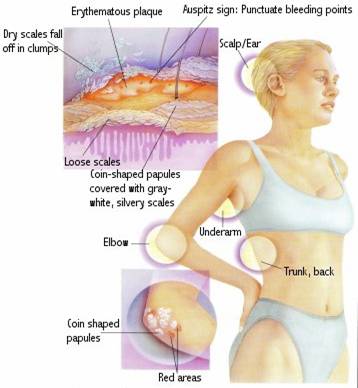Psoriasis is a common, chronic, disfiguring, inflammatory and proliferative condition of the skin, in which genetic and , environmental and immune system influences have a critical role. immune system causes your skin cells to reproduce too quickly. A normal skin cell matures and falls off the body’s surface in 28 to 30 days . When psoriasis develops, the skin cells mature in 3 to 6 days and move to the skin surface. Instead of falling off (shedding), the cells pile up and form lesions. The skin also becomes very red due to increased blood flow.
Psoriasis is not contagious. It is not something you can “catch” or “pass on.” The lesions may not look good, but they are not infections or open wounds. People with psoriasis pose no threat to the health or safety of others.
Psoriasis affects adult males and females equally. Among children and adolescents, plaque psoriasis has been found to affect females more than males, but this observation may be due to the earlier age of onset in females. psoriasis first appears during 2 peak age ranges. The first peak occurs in persons aged 16-22 years, and the second occurs in persons aged 57-60 years.
Psoriasis may be linked to some systemic metabolic co-morbidities such as obesity, hyperlipidemia, cardiovascular disease, and diabetes. Vitiligo may further develop psoriatic lesions . Psoriasis has many lines for treatments such as topical , systemic , biologics, alternative and others.
Stigma can quickly cause those living with psoriasis to change their behavior. As people start to notice their skin, they become more self-conscious and anxious. They start covering-up their psoriasis and making excuses for it. They opt out of social situations. Severe stigma can alter a person's whole personality, changing a confident, outgoing person into someone ashamed and withdrawn. most people living with psoriasis don't become clinically depressed. But even mild cases can result in chronic stress. Stress makes the psoriasis worse, and the psoriasis makes the stress worse .
What Should you Do ?
But I should know it will be cured and I have a chance to live normally cooperating with the disease . I will get red of the bad impression about us . I will follow the steps for treatment beginning from diet to the drugs .
Stay connected. Psoriasis is a condition that can pull you away from others. Don't let that happen. You need the support of the people you trust and care about right now. So even when you're feeling down or self-conscious, try to push through it. Also, consider joining a support group for people coping with psoriasis -- the National Psoriasis Foundation sponsors them throughout the country.
Find a doctor you trust. Choosing the right doctor might not seem relevant to your emotional state, but it is. If you have confidence in your doctor, you'll probably be more confident in your treatment. That can give you a more optimistic view in general. A good doctor can also advise you on issues beyond the medical.
See a therapist. Many people living with psoriasis seek out therapists. Will therapy solve everything? Will it prevent you from feeling humiliated if a stranger keeps staring at the plaques on your arms? No. But it can help you learn better ways to cope with the social situations that you'll encounter. See if your dermatologist has any recommendations for a therapist who has experience treating people with psoriasis and similar conditions.
psoriasis video
Skin video
See also for more informations about skin diseases
psoriasis video
Skin video
See also for more informations about skin diseases


0 التعليقات:
إرسال تعليق